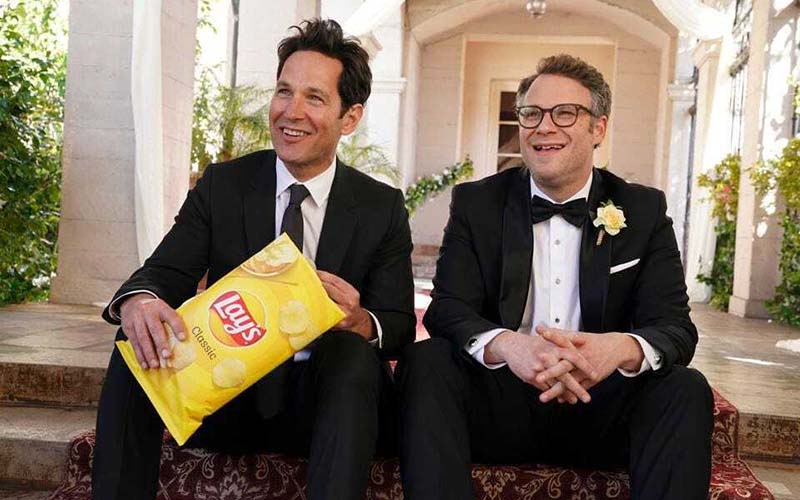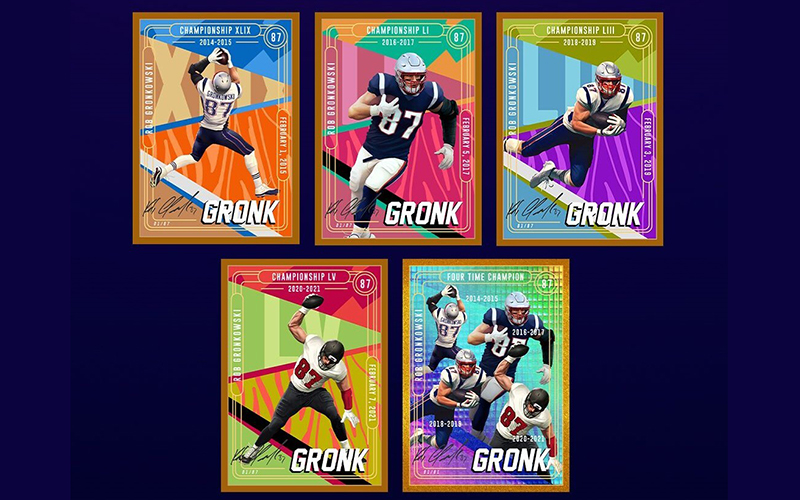
Paul Rudd, left, and Seth Rogan were among the actors that starred in commercials during the Super Bowl that were more upbeat than some of the ads last years, several which touched upon politics or the pandemic. (Photo courtesy of Frito-Lay North America)
PHOENIX – From a commercial featuring a virtual assistant reading the thoughts of comic Colin Jost and his wife, actress Scarlett Johansson, to a potato chip ad featuring Seth Rogan marrying a zombie, many advertisers took a lighter tone for spots during Super Bowl Sunday.
Even 72SOLD, a local real estate company that paid for three spots which aired only locally on NBC’s KPNX Channel 12 affiliate, adopted an upbeat tone, offering to pay a homeowner’s mortgage payment for 72 months.
“There’s a ricochet away off the deep, COVID-centric and political ads of a year ago,” said Mark DiMassimo, founder and creative chief at the marketing firm DiGo.
DiMassimo anticipated the change in tone from advertisers who paid nearly $7 million for 30 seconds of air time during Super Bowl LVI on NBC.
A year ago, CBS charged $5.5 million for 30 seconds during Super Bowl LV, but because of the COVID-19 pandemic, companies were trimming their advertising budgets, production was more difficult and traditional Super Bowl advertisers such as Budweiser, Pepsi and Coca-Cola even chose to completely sit it out.
A handful of companies, including Ford, Jeep and Anheuser-Busch, produced spots that addressed the pandemic or the political divide in the country.
While Coke still sat out this year’s Super Bowl, other companies adopted a more traditional, upbeat or humorous tone – spared no expense.
“Big budget, names and celebrities affected a quarter or a third of the spots this year,”DiMassimo said. “Many of them get downright goofy and aim to be humorous spectacles.”
While the more positive vibe and humorous tone of this year’s commercials often hit the mark – including the Amazon Alexa ad with Jost and Johansson, DiMassimo said a few failed to connect, including spots for Bud Light Hard Seltzer and Taco Bell.
DiGo’s bills itself as an agency for “positive behavior change” and works with brands that “help people make better choices and form better habits,” according to the firm’s website. So DiMassimo believes the message behind the creativity has to come through to the audience for a commercial to land with consumers.
“I worry that more and more advertisers are just trying to do show business, trying to have celebrities make the audience laugh,” DiMassimo said. “I think in many cases that comes at the expense of making an incredibly effective commercial.”
Greg Hague, founder of 72SOLD, also used Super Bowl air time to promote a giveaway. A limited number of spots are available to local affiliates during the game, and Hague’s company spent roughly $500,000 on three time slots to promote a drawing, with 72SOLD paying the winner’s home mortgage for 72 months.
“It was all about Arizona, ‘Thank you for doing what you’ve done for us,’” Hague said. “And as a thank you, while we can’t help everybody, we can help one person.
“So we define that as give-back marketing (positive behavioral) in a charitable sense,” Hague said. “And simply to the public to say, ‘Look, we want to give back for making us who we are.’”
An effective commercial is essential, especially for national spots and the price tag that comes with a Super Bowl ad. NBC’s rate of nearly $7 million for a 30 second time slot is an 18% increase from the CBS rate in 2021 for 30 seconds.
But even with the higher price for airtime, companies didn’t hold back this year on production quality and special effects.
“I think there’s a snapback effect because it was hard to do productions in the previous couple of years because of the pandemic,” DiMassimo said.
Cryptocurrency companies were a notable addition to the 2022 Super Bowl lineup, and a couple made a big splash. Coinbase sent a QR code bouncing across television screens. Crypto.com featured LeBron James visiting his younger self to tell him he has to call his own shots. FTX, a Bohemian crypto exchange, and eToro, which is an Israeli brokerage firm that specializes in trading cryptocurrencies, also aired spots during the game.
“Crypto related advertisers and assets have ballooned to the point where they could be among the biggest budget advertisers,” DiMassimo said.
Crypto went big this year with Coinbase spending $13 million dollars for their time slot. The companies landed roughly 20 million hits on their homepage, according to Surojit Chatterjee, chief product officer at Coinbase.
The Coinbase QR code sent viewers to a promotion for $15 of free cryptocurrency and a chance to win some of $3 million in prizes for signing up for the company’s app. It was so popular that the app reportedly crashed temporarily.
“They just want to get as many people into this game as possible, because it’s usually value creating for them,” said DiMassimo, who includes crypto companies among the kinds of brands DiGo wants to work with.
“We’re a positive behavior change focused agency and the adoption of crypto is a big theme with us,” DiMassimo said.

